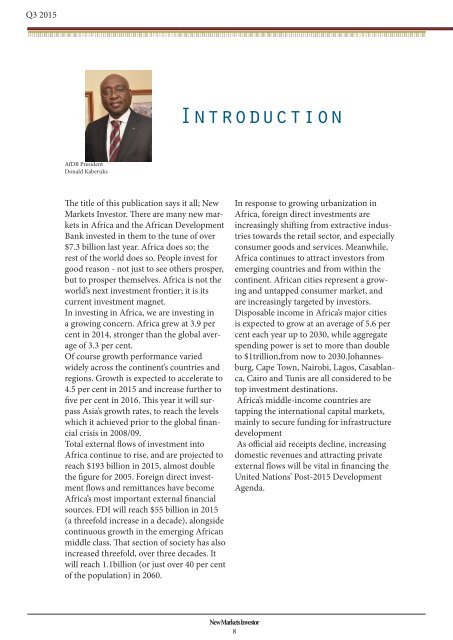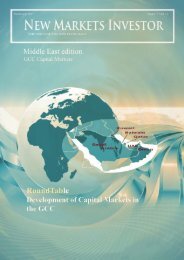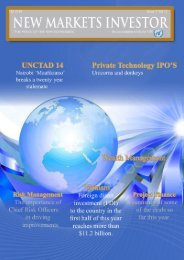New Markets Investor
Published by The Media Corporation
Published by The Media Corporation
Create successful ePaper yourself
Turn your PDF publications into a flip-book with our unique Google optimized e-Paper software.
Q3 2015IntroductionAfDB PresidentDonald KaberuksThe title of this publication says it all; <strong>New</strong><strong>Markets</strong> <strong>Investor</strong>. There are many new marketsin Africa and the African DevelopmentBank invested in them to the tune of over$7.3 billion last year. Africa does so; therest of the world does so. People invest forgood reason - not just to see others prosper,but to prosper themselves. Africa is not theworld’s next investment frontier; it is itscurrent investment magnet.In investing in Africa, we are investing ina growing concern. Africa grew at 3.9 percent in 2014, stronger than the global averageof 3.3 per cent.Of course growth performance variedwidely across the continent’s countries andregions. Growth is expected to accelerate to4.5 per cent in 2015 and increase further tofive per cent in 2016. This year it will surpassAsia’s growth rates, to reach the levelswhich it achieved prior to the global financialcrisis in 2008/09.Total external flows of investment intoAfrica continue to rise, and are projected toreach $193 billion in 2015, almost doublethe figure for 2005. Foreign direct investmentflows and remittances have becomeAfrica’s most important external financialsources. FDI will reach $55 billion in 2015(a threefold increase in a decade), alongsidecontinuous growth in the emerging Africanmiddle class. That section of society has alsoincreased threefold, over three decades. Itwill reach 1.1billion (or just over 40 per centof the population) in 2060.In response to growing urbanization inAfrica, foreign direct investments areincreasingly shifting from extractive industriestowards the retail sector, and especiallyconsumer goods and services. Meanwhile,Africa continues to attract investors fromemerging countries and from within thecontinent. African cities represent a growingand untapped consumer market, andare increasingly targeted by investors.Disposable income in Africa’s major citiesis expected to grow at an average of 5.6 percent each year up to 2030, while aggregatespending power is set to more than doubleto $1trillion,from now to 2030.Johannesburg,Cape Town, Nairobi, Lagos, Casablanca,Cairo and Tunis are all considered to betop investment destinations.Africa’s middle-income countries aretapping the international capital markets,mainly to secure funding for infrastructuredevelopmentAs official aid receipts decline, increasingdomestic revenues and attracting privateexternal flows will be vital in financing theUnited Nations’ Post-2015 DevelopmentAgenda.<strong>New</strong> <strong>Markets</strong> <strong>Investor</strong>8









